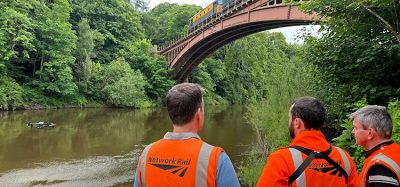World class rail testing facility in Wales gains £50 million government funding
Posted: 23 March 2021 | Global Railway Review | No comments yet
The Global Centre of Rail Excellence in Wales will act as a driver for accelerated rail industry innovation, investment and growth in the UK and internationally.


Credit: Transport for Wales
Plans for the construction of a world class rail testing facility on a former opencast mining site at the head of the Dulais and Tawe Valleys in South Wales have taken a giant leap forward with the announcement of £50 million in Welsh government support for the delivery of the Global Centre of Rail Excellence (GCRE).
The train, rail infrastructure and technology testing facility, will provide a unique capability for the UK and Europe by supporting innovation in the UK and international rail industry, including the testing of cutting-edge, green technologies.
The Welsh government has been working in partnership with Neath Port Talbot and Powys Councils to develop proposals for the GCRE, which will be located on the site of the Nant Helen Open Cast Mine in Onllwyn, currently operated by Celtic Energy.
In order to deliver the first phase of the project, the Welsh government has confirmed a £50 million capital funding loan to be given to Powys Council. Earlier in March 2021, the UK government pledged up to £30 million in funding for the pioneering project in the Spring Budget.
In further milestone developments, a land option deal has been completed for the sites at the Nant Helen surface mine and Onllwyn coal washery, which will see Celtic Energy gift all of the land necessary for the project. A formal planning application will also be submitted in late March 2021 for a purpose-built and modern railway infrastructure, systems and rolling stock test and validation complex. The facility will act as a driver for accelerated rail industry innovation, investment and growth in Wales, the UK and internationally.
To take the project forward, a new GCRE Company will be established as the project transitions from government-led and supported by the industry, to industry-led and supported by the government.
Ken Skates, the Welsh Minister for Economy, Transport and North Wales, said: “This is an enormously significant step forward in our plans to deliver a world class facility with unique-to-Europe integrated capabilities. GCRE will be a powerful ‘magnet’ project, bringing a major global industry closer to Wales. It will provide a raft of vital services and wide ranging research, development and innovation platforms to UK and international train manufacturers, network operators, the wider industry, the supply chain and academia. It will also provide significant direct benefits to our national operator, Transport for Wales. Working alongside our public and private sector partners, we will deliver high quality jobs and training opportunities whilst supporting Welsh exports for decades to come.”
A joint venture was established in 2019 between the Welsh government and both Powys and Neath Port Talbot Councils to support project development and delivery. The proposals are the result of collaborative working with partners and extensive engagement and consultation with stakeholders and local communities.
Nigel Brinn, Corporate Director (Economy and Environment) at Powys County Council, said: “We are delighted that both the UK and Welsh governments have confirmed that they are able to invest in this extremely important project on the Powys border. The opportunity to deliver such an innovative and economically beneficial restoration and after use for the site is very much welcomed by all at Powys County Council.”
He continued: “We look forward to progressing the project as quickly as possible with our joint venture partners: the Welsh government and Neath Port Talbot Council. We are fully committed to doing everything that we possibly can to play our part in delivering this project of truly international significance. The opportunity and potential of this project is widely acknowledged, and we are absolutely committed to ensuring that the maximum overall benefit to the region is achieved. We are extremely excited about the opportunity that this initial investment will create, working with research and development partners to establish this Centre of Rail Excellence.”
Neath Port Talbot Council’s Corporate Director of Environment and Regeneration, Nicola Pearce, said: “Neath Port Talbot Council, the Welsh government and Powys County Council have worked hard with a range of partners to help to reach this key milestone. Subject to planning and other approvals, the Global Centre of Rail Excellence will create a world class facility for the research, development and testing of rail technology, offering major opportunities for economic growth in the South Wales Valleys and throughout Neath Port Talbot. We look forward to continuing to work with the Welsh government and our other partners as this project is delivered.”
The plans are an important addition to the site strategy being brought forward by Celtic Energy, following approval of its restoration proposals in April 2020 and second planning application, approved in July 2020.
Will Watson, Celtic Energy’s Chief Executive, said: “As our coal mine operations come to the end of their natural lives, we have been working hard to ensure that local communities continue to benefit from well-paid, sustainable employment whilst we diversify our sites from coal to property, tourism and green energy. We are delighted that the Global Centre of Rail Excellence project has reached another key milestone, and we are looking forward to continuing our close working relationship with the Welsh government, local authorities and rail industry players to help to deliver a world class facility that will benefit people locally and globally.”
Richard Walters, Celtic Energy’s Chairman, added: “As part of the project, we have been committed to ensuring that the generations, who have previously relied on the coal industry for local employment, continue to benefit from access to sustainable employment. They will now have opportunities to support and promote the expanding rail industry in Wales and across the UK more widely.”
Related topics
Digitalisation, Funding & Finance, Infrastructure Developments, Rolling Stock Orders/Developments, Sustainability/Decarbonisation, Technology & Software, The Workforce, Track/Infrastructure Maintenance & Engineering
Related organisations
Related regions
Related people
Ken Skates, Nicola Pearce, Nigel Brinn, Richard Walters, Will Watson







